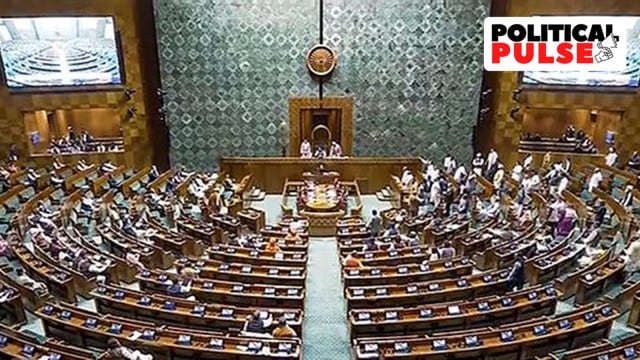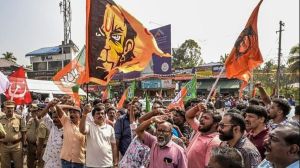MPs suspensions: At least 217 times since 2019, who and on what grounds
At 92, the 2023 Winter Session saw the highest number of suspensions in the 17th Lok Sabha
 Parliament winter session. (PTI)
Parliament winter session. (PTI)Parliament saw three more suspensions on Thursday (December 21). Congress MPs Deepak Baij, Nakul Nath and D K Suresh were suspended after they displayed placards, shouted slogans, and threw papers at the speaker chair.
This came a day after Kerala Congress Lok Sabha MP Thomas Chazhikadan and CPM MP AM Arif were suspended for displaying placards in the House.
On Tuesday (December 19), 49 MPs were suspended from the Lok Sabha. The day before, 78 MPs — 33 MPs in the Lok Sabha and 45 MPs in the Rajya Sabha — were suspended for the remainder of the winter session.
A week prior, amidst uproar in Parliament over a discussion on the security breach in Parliament, a total of 14 MPs were suspended.
The cumulative number of suspensions this Winter Session is 146: the highest ever in Indian parliamentary history.
The Opposition has regularly targeted the government over suspension of its MPs for protests over various issues – such as Manipur, Delhi services legislation and price rise, among others – and alleged stifling of their voices in Parliament.
We take a look at the MPs’ suspension, and its grounds, since 2019. Some MPs such as Eden, O’Brien and Tagore were suspended more than once. The data has been drawn from The Indian Express’ reporting on parliamentary proceedings.
Monsoon Session, 2023
The previous Monsoon Session of Parliament saw the suspension of four members of either House.
On July 24, the Rajya Sabha saw the suspension of AAP MP Sanjay Singh. This was the onset of the Session and the Opposition members had been raising slogans to demand a statement from the PM on Manipur. At one point, Singh moved closer to the Chairman’s podium, prompting Jagdeep Dhankhar to “name” him.
Leader of the Upper House Piyush Goyal said he would like to move a motion to suspend Singh, saying this “kind of behaviour… is completely against the ethics and rules of the House”. It was then put to vote and passed.
On August 3, the AAP’s lone Lok Sabha MP, Sushil Kumar Rinku, was suspended “for the remaining part of the Monsoon Session” over “unruly behaviour” while the House was considering the Delhi services Bill. Rinku had come to the Well of the House, torn some papers and thrown them in the direction of the Speaker.
After the Bill was passed, Birla asked Parliamentary Affairs Minister Pralhad Joshi to move a resolution for Rinku’s suspension.
On August 8, Trinamool Congress (TMC) Rajya Sabha MP Derek O’Brien almost got suspended after getting into a heated argument with Chairman Dhankhar. While Goyal moved a motion in this regard against O’Brien “for continuously and wilfully disturbing the proceedings… for disobeying the Chair”, the motion was finally not put to vote.
Two days later, the Lok Sabha had suspended Adhir Ranjan Chowdhury, the leader of the Congress in the House, for “repeated misconduct”, pending an investigation by the Privileges Committee. Soon after Prime Minister Narendra Modi had finished his speech in the no-confidence motion debate, the Parliamentary Affairs Minister moved a resolution for Chowdhury’s suspension – with no one present in the Opposition Benches – accusing him of “disturbing” the House. The resolution was passed by a voice vote.
A day later, it was the turn of AAP Rajya Sabha MP Raghav Chadha, who was suspended after a motion moved by Leader of the House Piyush Goyal accusing him of “gross violation of rules and misconduct”, with his case referred to the Privileges Committee. This came days after four MPs – two from the BJP and one each from its ally AIADMK and the BJD – charged that their names had been added by Chadha in a proposal for a Select Committee over the Delhi services Bill “without their consent”.
Budget Session, 2023
During the Budget Session, on February 10, Congress MP Rajani Patil was suspended from the Rajya Sabha for allegedly videographing the proceedings of the House. Dhankhar took the disciplinary action after the BJP complained about a tweeted video showing the Opposition agitation during Modi’s reply on the motion of thanks.
On August 7, the Rajya Sabha revoked the suspension of Patil. BJP MP Saroj Pandey, presenting the report of the Committee of Privileges, said the panel held Patil guilty but considered her suspension till then to be adequate, revoking it with effect from August 7, a day ahead of the no-trust debate.
Monsoon Session, 2022
On July 26 last year, 19 MPs pressing for an urgent discussion on price rise and GST hike were suspended from the Rajya Sabha for a week. They were Sushmita Dev, Mausam Noor, Shanta Chhetri, Dola Sen, Santanu Sen, Abir Ranjan Biswas, and Md Nadimul Haque from the TMC; M Mohamed Abdulla, S Kalyanasundaram, R Girirajan, N R Elango, M Shanmugam, and Kanimozhi NVN Somu from the DMK; B Lingaiah Yadav, Ravichandra Vaddiraju, and Damodar Rao Divakonda from the Telangana Rashtra Samithi (now the Bharat Rashtra Samithi); A A Rahim and V Sivadasan from the CPI(M); and P Santhosh Kumar from the CPI.
A day prior to it, four Congress Lok Sabha MPs – Manickam Tagore, Ramya Haridas, T N Prathapan and S Jothimani – were named by the Chair, under Rule 374 of the Rules of Procedure and Conduct of Business in Parliament, for displaying placards in the House and were suspended for the remainder of that Session.
Winter Session, 2021
On November 29, 2021, 12 Opposition members were suspended from the Rajya Sabha on the very first day of the Session for “unprecedented acts of misconduct, contemptuous, unruly and violent behaviour and intentional attacks on security personnel”.
This was after they were suspended for their alleged misconduct towards the end of the Monsoon Session in August that year, when marshals were called after the Opposition MPs stormed the Well.
Parliament Sessions at the time were continuously disrupted over the Centre’s three farm laws, which had seen widespread farmer protests and were later withdrawn by the government.
The suspended members comprised six MPs from the Congress (Phulo Devi Netam, Chhaya Verma, Ripun Bora, Rajamani Patel, Syed Nasir Hussain and Akhilesh Prasad Singh); 2 from the TMC (Dola Sen, Shanta Chhetri); 2 from the united Shiv Sena (Priyanka Chaturvedi, Anil Desai); Elamaram Kareem of the CPI(M); and Binoy Viswam of the CPI.
Monsoon Session, 2020
On September 21, eight Rajya Sabha MPs were suspended for alleged unruly behaviour in the Upper House the previous day (September 20). The motion was passed by a voice vote.
The government had moved a motion seeking the suspension of Derek O’Brien (TMC), Sanjay Singh (AAP), Rajeev Satav (Congress), K K Ragesh (CPI-M), Syed Nazir Hussain (Congress), Ripun Bora (Congress), Dola Sen (TMC) and Elamaram Kareem (CPI-M).
After the motion was adopted, the then Chairman, M Venkaiah Naidu, asked the MPs to leave the House. The suspended members initially refused to leave, and then sat on a dharna outside Parliament. The Opposition parties sharply criticised their suspension.
Budget Session, 2020
On March 5, 2020, the Lok Sabha suspended seven Congress MPs – Gaurav Gogoi, T N Prathapan, Dean Kuriakose, R Unnithan, Manickam Tagore, Benny Behanan and Gurjeet Singh Aujla – for “gross misconduct” after they trooped into the Well and snatched papers from the Speaker’s table.
The Congress members were protesting against a Rajasthan MP who called for a probe on whether coronavirus was being spread from the “home” of then Congress president Sonia Gandhi, after a surge in cases of the virus reported from Italy.
Winter Session, 2019
On November 25, 2019, the Lok Sabha Speaker suspended Congress MPs, Hibi Eden and T N Prathapan, for storming the well of the House and obstructing the proceedings by shouting slogans to protest against the swearing-in of a BJP-led government in Maharashtra in the wee hours, with Devendra Fadnavis as the Chief Minister and NCP leader Ajit Pawar as the Deputy CM.
The Congress leaders were carrying placards with messages like “save Constitution” and “save democracy” and a black banner reading “stop murder of democracy”, and jostled with the marshals.
.
- 01
- 02
- 03
- 04
- 05































